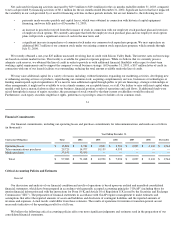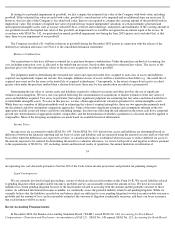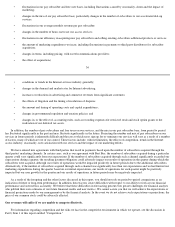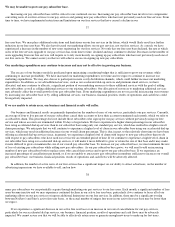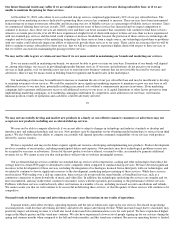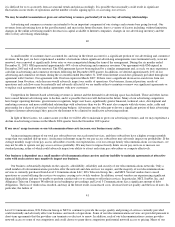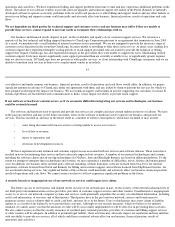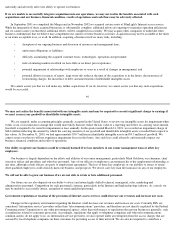Classmates.com 2003 Annual Report Download - page 33
Download and view the complete annual report
Please find page 33 of the 2003 Classmates.com annual report below. You can navigate through the pages in the report by either clicking on the pages listed below, or by using the keyword search tool below to find specific information within the annual report.
telecommunications providers compete with us in the market to provide consumer Internet access. As a result, any or all of our current
telecommunications service providers could discontinue providing us with service at rates acceptable to us, or at all, which could materially and
adversely affect our business, financial position, results of operations and cash flows.
Market rates for telecommunications services used in our business have declined significantly in recent years. We do not anticipate that
such rates will continue to decline at the same rate in the future, if at all. General market forces, the failure of providers, regulatory issues and
other factors could result in increased rates. Any increase in market rates would increase the cost of providing our services and, if significant,
could have a material adverse effect on our business, financial position, results of operations and cash flows.
If we fail to manage our telecommunications or our internal network capacities, our service levels may suffer or we may experience
increased per-user costs.
We will have to accurately anticipate our future telecommunications capacity needs within lead-time requirements. If we fail to procure
sufficient quantities of telecommunications services, we may be unable to provide our users with acceptable service levels. We also run the risk
of purchasing excessive amounts of telecommunications services. In that event, we would incur the costs of excess telecommunications
capacity without commensurate increases in revenues. We have experienced such overcapacity in the past, and we may experience
overcapacity in the future. Our failure to effectively manage telecommunications costs would likely have a material adverse effect on our
business, financial position, results of operations and cash flows.
In addition, we may from time to time experience increases in our telecommunications usage that exceed our then-available
telecommunications capacity and the capacity of our internal servers. As a result, users may be unable to register or log on to our services, may
experience a general slow-
down in their Internet access or may be disconnected from their sessions. Excessive user demand could also result in
system failures of our internal server networks, which would prevent us from generating advertising revenues. Inaccessibility, interruptions or
other limitations on the ability to access our services due to excessive user demand, or any failure of our servers to handle user traffic, could
have a material adverse effect on our reputation and our revenues.
Our business will suffer if the scope or quality of service from our telecommunications carriers is inadequate.
If our telecommunications service providers deliver unacceptable service, the quality of our Internet access service would suffer. In this
event, we would likely lose users who are dissatisfied with our service. Since we do not have direct control over our telecommunications
carriers' network reliability and the quality of their service, we cannot assure you that we will be able to provide consistently reliable Internet
access for our users.
We do not offer Internet access in all areas. Many potential users may be unable to access our services through a point of presence that is
within their local calling area. These users may be particularly reluctant to use our services to access the Internet due to the telecommunications
charges that they would incur. We cannot be sure if or when additional infrastructure developments by our
42
telecommunications providers will establish points of presence that cover these areas at costs acceptable to us.
If we are unable to successfully defend against legal actions, we could face substantial liabilities.
We are currently parties to various legal actions. Defending against these lawsuits may involve significant expense and diversion of
management's attention and resources from other matters. Due to the inherent uncertainties of litigation, we may not prevail in these actions. In
addition, our ongoing operations continue to subject us to significant litigation risks and costs in the future. Both the costs of defending
lawsuits and any settlements or judgments against us could materially and adversely affect our business, financial position, results of operations
and cash flows.
Our business is highly dependent on our billing and customer support systems, which are based on a combination of third-party
software and internally developed software.
The software that operates our billing and customer support systems is licensed from Portal Software, Inc. and Remedy, a BMC Software
Company, and we use a combination of Portal, Remedy and other third-party and internally developed software applications for customer
billing and support. Customer billing and support is a highly complex process, and our systems must efficiently interface with other third
parties' systems such as the systems of credit card processing companies and other companies to whom we outsource billing and support
functions. Our ability to accurately and efficiently bill and support our users is dependent on the successful operation of our billing and support
systems and third parties' systems upon which we rely. In addition, our ability to offer new pay services or alternative payment plans is
dependent on our ability to customize our billing and support systems. Issues associated with these systems could cause a variety of problems
including the failure to bill and collect from users on a timely basis, over-charging or under-charging users, inaccurate financial and customer
data, excessive credit card chargebacks or refunds, delays in new product or payment plan introductions and other billing-related errors. Such
problems could lead to inaccurate reporting from time to time, which could adversely affect our business, financial position, results of




